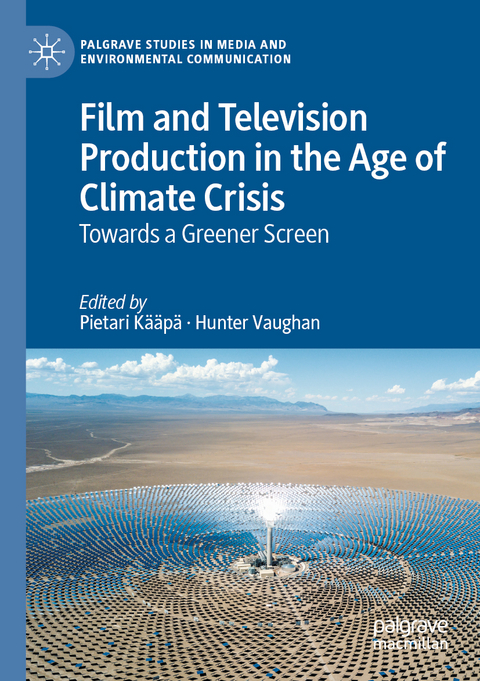
Film and Television Production in the Age of Climate Crisis
Springer International Publishing (Verlag)
978-3-030-98122-8 (ISBN)
Due to its immense sociocultural influence and economic resources, the global screen media industry is at the forefront of raising awareness for the political and social issues resulting from accelerated environmental instability. However, the 21st century relationship between screen media and the environment has another face that demands urgent scrutiny. The advent of the digital age and the vast electrical and Information and Communication Technologies (ICT) infrastructures required to support digital production, distribution, and archiving has resulted in the rapid expansion and diversification of the industry's resource use, infrastructure construction, energy dependency, and consequent waste and emissions production. Addressing these structures is essential to alleviating their environmental and social impact and ensuring that the industry's rhetoric on environmental responsibility is reflected in its practice.
As a mitigating counterbalance to the above trends, there has been a heightenedpush for sustainability measures along various lines of industry management, policy, and practice. These initiatives-including the cultural values they reflect, the political economies that form their logic, the managerial and marketing tactics that orchestrate them, and the environmental realities of their implementation-form the central object of inquiry for this collection.
Pietari Kaapa is Reader in Media and Communications at the University of Warwick. He works in the field of environmental media studies with a specific focus on media management and industry studies.
Hunter Vaughan is Senior Research Associate at the Minderoo Centre forTechnology and Democracy, University of Cambridge.
Introduction_ Chapter 1.- Film and Television Production in the Era of Accelerated Climate Change: A Greener Screen?_ Section 1: Policy and governance_ Chapter 2.- Environmental media governance: strategies for encountering uncertainty and innovation in the screen media industries_ Chapter 3.- Policy Approaches to Green Film Practices: Local Solutions for a Planetary Problem_ Chapter 4.- European Screen Agencies and Sustainability: Interventions for Greening the Screen_ Section 2: Transnational green production_ Chapter 5.- The Necessity of Sustainable Filmmaking: Production Notes from Palestine, Burkina Faso, and Zanzibar_ Chapter 6.- The joys and pain of growth: outlook for the film industry and the audio-visual sector in Colombia_ Chapter 7.- Greening the Media Industry: a case study of Ireland_ Section 3: The futures of green media_ Chapter 8.- Passing on Responsibility: Obstacles to Green Film Production in the Netherlands_ Chapter 9.- Andrew McWirther: A scholarship of hope: taking stock of UK screen industries via the lens of digital work over digital solutionism_ Chapter 10.- Laura U. Marks and Radek Przedpelski: The Carbon Footprint of Streaming Media: Problems, Calculations, Solutions.
| Erscheinungsdatum | 22.08.2023 |
|---|---|
| Reihe/Serie | Palgrave Studies in Media and Environmental Communication |
| Zusatzinfo | XV, 242 p. 2 illus. |
| Verlagsort | Cham |
| Sprache | englisch |
| Maße | 148 x 210 mm |
| Gewicht | 343 g |
| Themenwelt | Sozialwissenschaften ► Kommunikation / Medien ► Kommunikationswissenschaft |
| Sozialwissenschaften ► Kommunikation / Medien ► Medienwissenschaft | |
| Schlagworte | Ecocinema • Ecocriticism • Greening • media production • screen industries • SDG • sustainability • Sustainable Development Goals |
| ISBN-10 | 3-030-98122-3 / 3030981223 |
| ISBN-13 | 978-3-030-98122-8 / 9783030981228 |
| Zustand | Neuware |
| Informationen gemäß Produktsicherheitsverordnung (GPSR) | |
| Haben Sie eine Frage zum Produkt? |
aus dem Bereich


